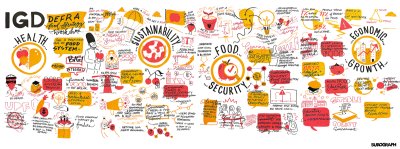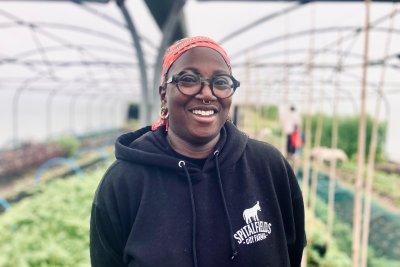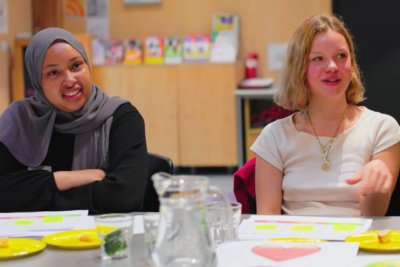

Learning lessons for holiday food provision this winter
The October half term illustrated both the importance of government stepping up to support holiday provision and the role that community organisations and businesses are playing. As part of our Winter Resilience series of blogs Sara Mekerri and Simon Shaw reflect on the successes and challenges experienced by local organisations around the country and the learning for the upcoming Christmas holidays and beyond.
What we heard from local areas
Following the UK Government’s failure to extend free school meals in England for the October half term, many voluntary organisations, local authorities, and food businesses were quick to offer support to families at risk.
Food Power and Sustainable Food Places organised an emergency meeting of food poverty alliances and food partnerships during half-term to share their experiences of trying to deal with high levels of need and multiple offers of support. They shared valuable insights into the successes and challenges they faced during this time.
In areas where holiday programmes have been running during previous holiday periods, the combination of educational activities with the provision of nutritional food has worked to reduce stigma surrounding food insecurity. But these schemes do not currently run nationwide and are usually only able to accommodate the children at greater risk due to limited resources and capacity.
There was a shared consensus that the response is most effective where there is a ‘cash-first’ approach, such as grants for eligible families as opposed to jumping straight to providing food, as this maximises dignity and choice for families. But we heard how in some areas, the lateness of the Government’s decision meant that councils were not able to make sure financial support reached families by the start of half-term. This emphasised the importance of early planning, as well as having a food poverty action plan.
We heard how the groundswell of local cafes and restaurants offering food was welcome and appreciated, but also threw up three challenges. Firstly, variability in the nutritional value of meals. It remains vital that children have access to healthy meals (as opposed to any food provided for example. by fast food chains), including fresh fruit and vegetables. Secondly, meals were not always offered in a way that recognised other financial barriers to accessing the meals for example. if people needed to pay for a bus fare to access free meals.
Finally, a lack of central coordination undermined efforts to reach everyone in need despite the availability of food. This highlights the importance of the coordinating role of councils as well as local food poverty alliances, and all involved asking themselves how to ensure collective action can reach all children in need.
We heard how organisations, such as networks in Cornwall and Devon work with health visitors, school nurses and welfare officers to identify needs. Nevertheless, identifying gaps and ensuring all children at risk are offered support remains a challenge.
Amongst these admirable actions undertaken to minimise holiday hunger, the over reliance on local organisations has resulted in volunteer burn out and a dependency on emergency responses as opposed to long-term policy reform which would minimise rising need for food aid amongst families with children. There remains growing urgency for national governments to address the root causes of food poverty, stemming from a flawed welfare system and cuts to social services
What next – how to avoid the same issues during future school holidays?
The Covid Winter Grant Scheme has been designed to support struggling families in England; at least 80% of the funding, or £136m, must be spent supporting children and families. Local authorities are planning to spend the funding in different ways, yet food provision during the Christmas period will remain an unfortunate necessity as this grant scheme will only provide so much support. The budget is limited, the timeline only stretches to the end of March and the scheme will only be available to some children and families with no recourse to public funds.
Here are five recommendations for what we should be doing to prepare for this upcoming period based on learnings from previous holiday periods:
- Encouraging partnerships between local authorities, businesses, charities, and schools. This will be helpful in creating a more coordinated response, maximising efficiency, ensuring further reach, identifying need and lessening food waste.
- Centring cash-first approaches (including local welfare assistance schemes and other direct cash transfers, alongside vouchers) and ensuring that funding is received on time.
- Reflecting on how dignity can be maximised in the provision of food and exploring approaches that will enable us to put this into practise, for example by creating feedback mechanisms to encourage user input and incorporating choice as much as possible.
- Promoting appropriate nutrition to local organisations involved in food provision to ensure that children are provided with nutritious options that accommodate dietary requirements and cultural preferences.
- Publicising support available in an accessible way, for example by promoting local maps of provision in newspapers and social media, creating leaflets that point individuals towards different support mechanisms and to the support that is most appropriate for them.
These shorter-term actions should sit alongside the creation of a food strategy for local areas to better prepare them to tackle sudden or upcoming crisis, as well as undertake preventative measures to maximise families' income and to ensure children's access to food.
We must also challenge myths regarding child food poverty. There was a feeling of frustration amongst our partners at the use of incorrect data and narratives to justify the decision to reject the extension of free school meals, and government’s capacity to respond to child food poverty overall.
Food Power: Food Power is an exciting new programme working with local communities across the UK to strengthen their ability to reduce food poverty.
Sustain
The Green House
244-254 Cambridge Heath Road
London E2 9DA
020 3559 6777
sustain@sustainweb.org
Sustain advocates food and agriculture policies and practices that enhance the health and welfare of people and animals, improve the working and living environment, promote equity and enrich society and culture.
© Sustain 2025
Registered charity (no. 1018643)
Data privacy & cookies
Icons by Icons8







